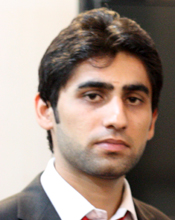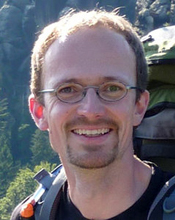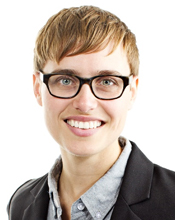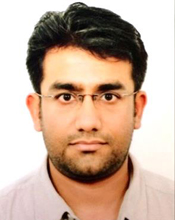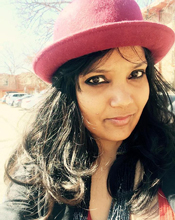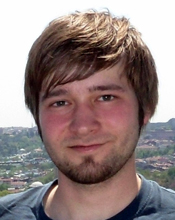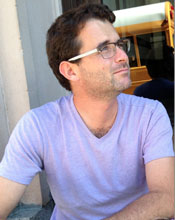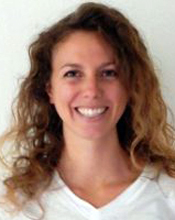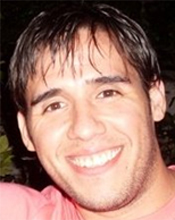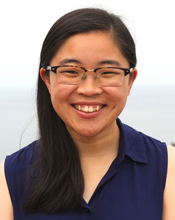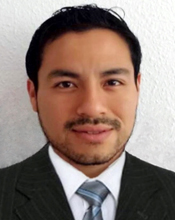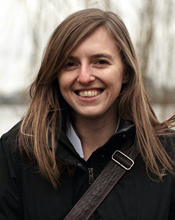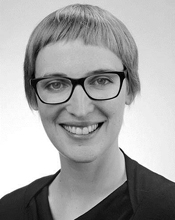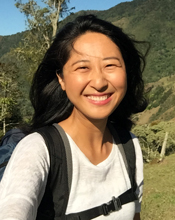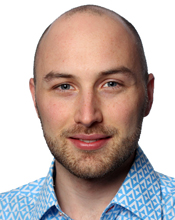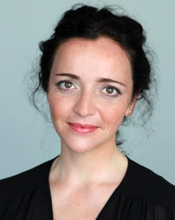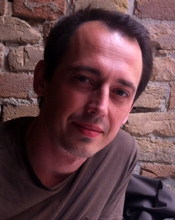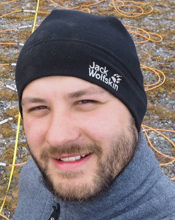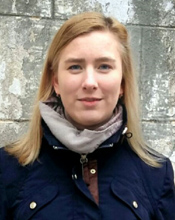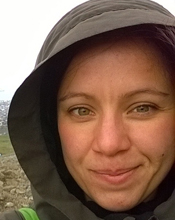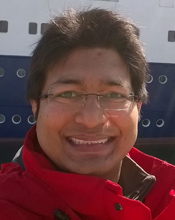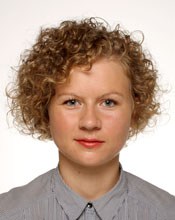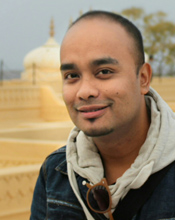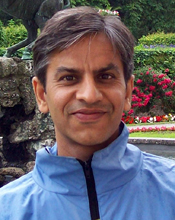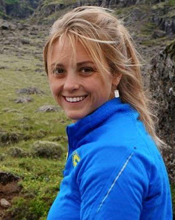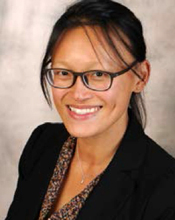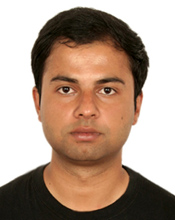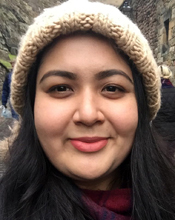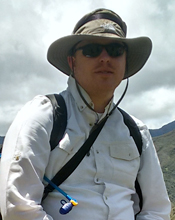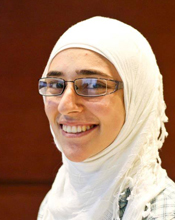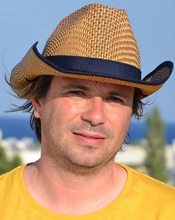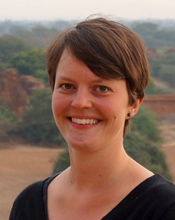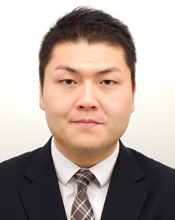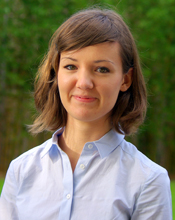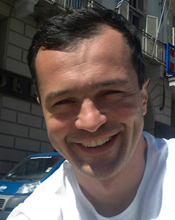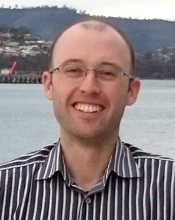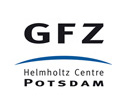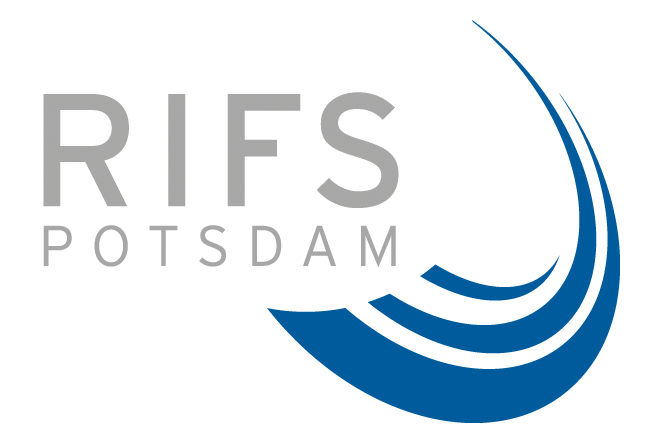Participants 2016
Participants 2016
The short bios are presented in alphabetical order. This shall give speakers and fellow participants an idea about the professional backgrounds of the attendees of the forthcoming summer school.
Last update: 01.09.2016
Zeeshan Ashfaq
is currently employed at the World Wind Energy Association as Policy and Research Analyst, he is responsible for association’s activities portfolio in Pakistan ranging from policy research to capacity building. He is implementing a demand-driven project that aims at conducting a comprehensive analysis of country’s institutional capacities for policy making and effective implementation along with renewable energy (RE) market regulations. In voluntary capacity, he works as a core member of Regional Green Dialog Network established to create shared knowledge, awareness and capacity to support peace and development in Pakistan and Afghanistan. Previously, he worked with SAARC Energy Centre and assisted in various research studies on RE policy and regulatory frameworks in the South Asian region. He holds MPhil International Relations and BS (hons) Politics & International Relations degrees, and specializes in International Politics, Environmental Security and RE Policy.
Tobias Bayr
is a meteorologist and postdoc researcher at GEOMAR Kiel, running and analysing climate models and I am working on El Niño Southern Oscillation and climate change in the tropics. Beside my work as a climate scientist, I am part of a team, that developed a website, where climate change interested people can do some climate change experiments with a simple globally resolved energy balance model ( mscm.dkrz.de ). So my main motivation to attend this summer school is to share, update and broaden my knowledge about climate.
An other motivation to attend this summer school is more a matter of heart. As I think much more should be done to stop climate change, I am a proponent of the bottom-up approach to climate change. After my PhD I took a year timeout from working as a climate scientist and lived, worked and learned as a volunteer in the ecovillage and community ZEGG in Bad Belzig (one hour by train from Potsdam), which is part of the global ecovillage network. The ZEGG community is an ecovillage of 100 people living and working together cooperatively, with a CO2 footprint per person only half as big as the average in Germany. I would like to organise an excursion for interested participants of the summer school to the ecovillage ZEGG on Sunday 11th September
Anna Berkmann
currently works as a Consultant for Johanssen + Kretschmer in Berlin; her primary foci are the energy sector and corporate social responsibility. She assists in identifying and conceptualizing strategic communication concepts and measures for clients in the public and private sector. She also provides support in the context of establishing, facilitating and fostering dialogue amongst stakeholders, policymakers and the wider public. Prior to this, she assisted the Head of Communication at the Representation of the EU Commission in Sweden and was in charge for external communication regarding the research project “Environmental Governance in Context”. Anna holds a BA degree in Political Science from Vienna University (Austria) and received her MSc in Environmental Policy and Communication from the Department of Natural Sciences, Technology and Environmental Studies at the Södertörn Högskolan (Sweden). While her research interest primarily focused on EU Environmental Policy (i.e. climate change impacts/risk frames and the CAP reform), her professional interest lies in building bridges between the corporate and political sector in order to enable and generate decarbonisation possibilities and in fostering public awareness and capacity on climate change. In addition, Anna is interested in exploring opportunities of cooperation, translating scientific knowledge into public information and policy tools as well as merging intelligent IT-based platforms, scientific research and business smartly, to approach complex transboundary challenges looming behind the issue climate change.
Saurabh Bhardwaj
is a fellow at TERI and associate faculty at TERI University, India with around 10 years of work experience in atmospheric & climate science, impact modelling, training and project management. He is a double Masters with majors in Space Science and Atmospheric Physics. His recent work includes improving model efficacy to minimize uncertainty in forecasting, high resolution climate knowledge generation, multi sectoral climate analysis and capacity building of researchers & policy makers. His research has been published in Vision, American Geophysical Union, European Geosciences Union and Pollution Research.
Atreyee Bhattacharya
is a geochemist and studies impacts of climate variability on terrestrial and marine environments on timescales spanning decades to millions of years. Currently, she is studying environmental response to droughts in central India. She is also developing corals as environmental archives. Atreyee received her Ph.D in Earth and Planetary Sciences from Harvard University in 2012. After a year of research and teaching at North Carolina State University, Atreyee completed a postdoctoral training at University of California-Los Angeles. In 2015, Atreyee joined as a faculty member in the Environmental Studies Department at University of Colorado Boulder. She also holds a research affiliation at the Institute of Arctic and Alpine Research, CU Boulder and the Indian Institute for Human Settlements (IIHS), Bangalore. Atreyee has worked with several organizations as a climate and environmental science writer and continues to pursue writing in public forums. Atreyee also enjoys painting, cooking (and food writing), short story writing and photography!
Maik Billing
I studied Physics at University of Potsdam. In my early career stages I worked on solar cells, aiming to contribute to a more sustainable and ecological energy supply. Similarly, I felt a strong interest in climatology and earth science which was strengthened by lectures about climate- and geophysics during my main study and several post graduate working experiences, so that it became my long term goal to work as a scientist in climate research. After finishing my studies, I worked at GFZ in the field of applied seismology and continued my career working at PIK on the planetary boundary of fresh water use with a global dynamic hydrology and vegetation model. Still searching for PhD positions in climatology and planetary science, I will start working in the field of ecosystem modeling at Freie Universität Berlin as a student assistant within the next months. In my free time I enjoy playing volleyball, swimming and urban gardening in an intercultural community garden in Berlin-Schöneberg.
Drew Bush
A guest scholar at the United States National Aeronautics and Space Administration’s (NASA) Goddard Institute for Space Studies in New York, NY, Drew Bush is working to complete his McGill University doctoral dissertation in the Department of Geography and School of Environment. His research examines how inquiry-based teaching using a classroom adapted NASA-GISS global climate model (GCM) impacts student learning of climate change science. He has started the Be A Climate Modeler For A Week summer camp at McGill, conducted educational research at John Abbott College in Montreal, QC, and taught environmental studies students at New York University in New York, NY.
YoungHwa Cha
is currently conducting a PhD on city-level responses to climate change at the University of Edinburgh. Her research is exploring how climate change interventions have influenced a paradigm shift within urban development dealing with risks and vulnerabilities.
She worked as a researcher at the Korean Adaptation Centre for Climate Change setting climate change adaptation strategy and action plans as well as the monitoring and evaluating their implementation. Through her Master’s degree in Urban Studies, she investigated the relationship between air temperature and the characteristics of urban land use in Seoul. Additionally, she has produced several papers and participated in projects analysing the form of sustainable cities and reviewing urban flood response & recovery plans.
Lila Collet
is a hydrologist and has been working on climate change impact to assess extreme events (droughts and floods) and develop adaptation strategies. She holds a PhD from University of Montpellier 2, France since 2013. This work focused on water supply sustainability in the Mediterranean context. She investigated how climate change could influence future water supply, water demand and water security, and solutions to be developed by local managers. Since 2015 she has been doing a post-doc at Heriot-Watt University, Edinburgh, Scotland. Her project focuses on developing a probabilistic approach to quantify uncertainties in extreme flows and flood mapping assessment as derived by climate change projections across the UK. She has been collaborating with water stakeholders and the industry to ensure the applicability of her work to their needs.
Sebastián Diez
belongs to the Advisory Council on Climate Change (Ministry of Water, Environment and Public Services) of the Cordoba Province and leads an interdisciplinary and inter-institutional work group for mitigation and adaptation strategies. He is also a researcher at the National Space Activities Commission (CONAE), and is working on the development and integration of geospatial technologies for the characterization of human health risks. He worked in the industry ten years (Volkswagen) and is currently Assistant Professor of the Master of Environmental Engineering at the National Technological University. He is specialist in pollutants emissions and air quality measurements, and currently he is working on several projects related to local and regional air quality modeling, human health risks due to air pollutants and transport modes impacts over climate change and local pollution.
Linh Do
is a social change advocate who has been working on environmental issues for the past near-decade. She has a background in community organising, campaigning, new media and strategy development. Linh is most in her element on-the-ground connecting people from different disciplinary skill sets for a common purpose.
Linh has worked with a wide array of individuals from high school students to UNEP and the Reuters Foundation. She is a co-founder of the technology start-up OurSay, formerly led the community organising program at the Australian Conservation Foundation and has worked with Climate Action Network International on communicating policy. Linh is signed with Claxton Speakers and has previously sat on both non-profit and for-profit boards. Her work has been featured in Al Jazeera, Vogue, the Huffington Post and the Washington Post amongst others.
Linh is currently the editor-in-chief at The Verb where she works with a global team to globalise and humanise stories from the UN climate change negotiations and UN sustainable development goals processes. In 2013, Linh was named a World Economic Forum Global Shaper, Australian Geographic Young Conservationist of the Year and one of Junior Chamber International Outstanding Young Persons of the World. She is based in Melbourne, Australia with extensive experience overseas.
Enrique Fernández Flores
is a Peruvian reasearcher who has worked on sustainable agriculture, climate change impact, renewable energy (small scale) and rural development topics for more than 8 years . He has gained a B.Sc. degree in Biotechnology, a Specialization in Agricultural Business Management (both at La Molina Agrarian University in Peru), and a M.Sc. degree in Agricultural Economics at the Humboldt University of Berlin in Germany. In addition, he has complemented his theoretical expertise with practical experience gained at organizations such as the Inter-American Development Bank (IADB), Economic Commission for Latin America and the Caribbean (ECLAC), German Institute for Economic Research (DIW-Berlin), International Potato Center (CGIAR-CIP), etc. He is currently working on the development of strategies that consider a sustainable approach as main motor for improving business conduction in rural areas.
Rafaela Flach
is a PhD candidate in the International Max Planck Research School on Earth System modeling(IMPRS-ESM) and member of the Research Unit Sustainability and Global Change in the University of Hamburg. She obtained a degree in Environmental Engineering from the Federal University of Parana, in Brazil, and has professional experience as water resources engineer in South Brazil. Later on she obtained a Master Degree from the University of Linkoping, Sweden, where she developed her Master Thesis in partnership with the Stockholm Environment Institute. Her research interests range from climate change impact assessment, global water cycle feedbacks, global trade related impacts to land use change.
Desiree Foerster
is a PhD candidate at the Institute for Arts and Media, University of Potsdam. She graduated in Philosophy, Literature (BA) and Media-Culture-Anylysis (MA). Desiree gave presentations about her research on interspecies relationships and new artistic and design practices at conferences such as the Annual Meeting of the Social Studies of Science Copenhagen 2012 and Denver 2015, gave workshops on Foucaults term
“heteropia” at the Utopia School Copenhagen 2015 and in Athens 2016, and participated in the New Materialism Training School “Research Genealogies and Material Practices” at Tate Modern, London 2016. Her research interests lie in medial, aestethical and epistemological aspects of complex phenomena and how they could be modeled by experimental systems in order to become bodily experienced. In her PhD she investigates if novel insights in the ways multispecies ecologies deal with disruption, might show fruitful parallels between the ecosystem of the microbiome and the ecosystem planet earth. As a Berlin based curator and researcher she also collaborates within various disciplines such as (synthetic) biology, computer science, philosophy and humanities, and is interested in creating space for assemblies that cross assumed and naturalized relations. Her work as a program assistant at the Haus der Kulturen der Welt was manly dedicated to the Anthropocene project and the Technosphere project.
Beibei Gu
is currently pursuing her MA degree in Global Environmental Policy at American University in Washington D.C., US. A Chinese native with extensive working experience in both non-profit and private sectors, Beibei is highly motivated in promoting good environmental governance and practices in China and the global South, in particular climate change policymaking. She has previously worked as project manager in the Institute of Public and Environmental Affairs (IPE), a leading Chinese Environmental NGO in Beijing specializing to promote environmental transparency and public participation. In this role, she has led the IPE initiative of ‘Green Stock’ Database as a tool for financial investors to identify environmental risks and promote responsible investment in China. She has also researched and advocated for clean air policy in China and engaged in various stakeholder dialogues to address the lack of transparency and accountability in China’s environmental governance structure. Her current research focus includes the use of big data to formulate climate change policies. She is looking forward to meeting fellow participants of Potsdam Summer School 2016.
Christopher Hedemann
is a PhD student at the Max Planck Institute of Meteorology in Hamburg, Germany. He studies how the surface temperature of the Earth can vary on decadal timescales from what we might expect, due to internal climate variability. Before starting his PhD, Christopher helped manage the reporting cycle for the water program at CDP, an NGO which leverages market forces to encourage the world’s largest companies to gather and disclose environmental information, in particular on the risks and opportunities of climate change.
Monica Hernandez Morcillo
is a Forestry Engineer currently working at the Geography Department of Humboldt University, handling a European project on “Sustainable Management of Cultural Landscapes”. In parallel she is finishing a Master on European Policy with focus on Climate Change also at the Humboldt University.
Monica has eight years of professional experience at the intersection of environmental conservation and development, promoting successful governance strategies for sustainable resources management. She has field-level experience in Europe and Latin America, where she was three years working in the Peruvian Amazon together with natives communities facilitating participatory processes to discern solutions to environmental conflicts. As a versatile Project Manager she has manage and collaborate with manifold European Projects (FP7, Horizon 2020, Life, Interreg) accomplishing complex assignments from fundraising, planning and budgeting to implementation, communication with partners and reporting. During two years she worked for United Nations Environmental Programme (UNEP) in Cambridge, UK, providing scientific and technical support on biodiversity and ecosystem services assessments to national and global environmental policy makers. She has been also involved in the Pan-European consultations of the UN Intergovernmental Panel on Biodiversity & Ecosystem Services (IPBES).
She is interested in the implementation and compliance mechanisms of the Paris Agreement in Europe.
Timur Idrisov
holds a Master Degree in Journalism and has a long career in grassroots environmental movement in Tajikistan. Timur has been working on climate change issues since 2006. He actively participated in the information campaign on ratifying the Kyoto Protocol by Tajikistan. In 2008, 2009 and 2010 Timur attended UNFCCC COPs as a representative of a NGO and regularly reported outcomes of negotiations process to Tajikistan NGOs climate change network. He has more than 15 years’ experience in developing training curricula and materials and delivering workshops and trainings on various environmental issues, including climate change, at different levels and for various target groups.
Timur works as a senior adviser of the “Little Earth” environmental NGO and as a moderator of Tajikistan NGOs climate change network. He actively participates in projects and forums that tackle issues of climate change, environment and local communities’ development. As a member of the “Little Earth” team he has been working in the field of sustainable energy, energy efficiency and climate change adaptation in the local mountain communities for more than 10 years. Timur is a member of International Socio-Ecological Union and alumni of the Norwegian Peace Corps (Fredkorpset) International volunteers exchange program.
Marek Jaskólski
I’m PhD student in field of geography and spatial planning, interested in arctic region, its environment, the history of human activity and future potential. I’m particularly interested in interaction between human and environment in polar regions.
My work focus on the following areas:
• Arctic region
• Coastal hazards
• Sustainable spatial planning
• Risk assessment
• Environmental impact assessment
In my Master’s thesis I was focused on the impact of coastal zone changes on the community infrastructure in Svalbard. I also took part in several Polar expedition to Svalbard, organized by my home University of Wroclaw and also Marie Curie Sklodowska University from Lublin, Poland.
I’m currently participating a exchange scholarship program of the German Federal Environmental Foundation at Alfred Wegener Institute for Polar and Marine Research in Potsdam.
Kristina Kaar
I have completed Bachelor’s programme on environmental protection and Master’s programme on environmental management and cleaner production. I started my professional career at the first year of my Bachelor’s studies and have been working in the field of climate change since then. I am working as a leading specialist at Climate Department of the Estonian Environmental Research Centre, where my main work assignments include compilation of climate change and greenhouse gas emissions related reports (e.g. Greenhouse Gas Inventories, National Communications).
Elsi Kauppinen
has a PhD in eutrophication issues of aquatic ecosystems from the Department of Biology, University of Warsaw (Poland) and an MSc in ecology from the University of Joensuu (Finland).
She is currently working on adaptation to climate change from the perspective of aquatic ecosystems and agriculture in South-West Finland. Professionally she is interested in management and governance of aquatic ecosystems, which is strongly linked to questions related to agricultural practices and also changes caused by climate change.
Mahmudur Rahman Khan
Mahmudur Rahman Khan is an oceanographer dealing with three questions – ‘What, Why and How?’ to the changing ocean, in scientific-economic aspects, with global climate alteration. He is now a post graduate scholar in NF-POGO Center of Excellence (CofE) in Observational Oceanography at Alfred Wegener Institute for Polar and Marine Research, Germany. In his CofE research, he is investigating the consequences of environmental variables due to climate change on higher trophic levels.
Right before there, Mahmud was working on understanding the climate variabilities interacting the marine ecosystem components in Bangladesh. His earlier research on the role of climatology on phytoplankton dynamics and primary production, and it’s time series shifting due to climate variables by using model with long-term satellite data was for MS degree in Oceanography from University of Dhaka. His another research work was dedicated to climate change effects on salinity intrusion level in coastal areas of Bangladesh. Particularly, he is interested in modelling of fate and changing pattern of physical and biological coupling in ocean processes due to climate change. His main motivation to participate in this summer school is to learn more on climate research concerning mitigation and adaptation strategies in global and regional perspective by going through interaction with multidisciplinary experts in a global village of scientific community in Potsdam.
Jana Minářová
Currently, I am working in a co-supervised PhD program at the Faculty of Science, Charles University in Prague (Czech Republic) and the Laboratory Image, City, Environment at University of Strasbourg and National Centre for Scientific Research (France). My thesis deals with the heavy rainfall events, well known to be able to cause many natural disasters (e.g., floods), in Central Europe with an emphasis on mid-elevation mountain systems.
Previously, I have studied Geography and Cartography during my Bachelor degree and then focused on Physical Geography and Geoecology during Master degree studies. Climatology was my greatest interest all the time. In future, my aim is to participate in an interdisciplinary project, which would include not only the study of natural hazards but also the related risk management.
Robert Mizo
Born and raised in the North-Eastern state of Nagaland in India, Robert holds a PhD from the Department of Political Science, University of Delhi. Rooted in the larger discipline of International Environmental Politics, his thesis “Climate Change: Perspectives, Policies and Challenges for India and China” presented a comparative study of the climate policy choices pursued by China and India. It further attempted to analyse the scope, nature and extent for cooperation between the neighbours in dealing with the issue. Prior to his PhD, Robert pursued an M. Phil course at the Department of Political Science, University of Delhi. His dissertation titled “Environmental Security: India and the Challenge of Global Warming” sought to examine the various security dimensions of Climate Change for India – ecological, social, economic, political, and strategic.
Besides pursuing research on subjects related to Climate Change and Environmental Security, Robert has been serving as Assistant Professor in various colleges under the University of Delhi for more than six years. Currently, he teaches Political Science at the Kamala Nehru College, University of Delhi. The major courses he has taught include International Relations, Comparative Politics, and India’s Foreign Policy.
Robert is passionate about music, movies and poetry.
Kapil Narula
Kapil’s career goal is “to provide a leadership role to the world, onto a path of sustainable development and an energy secure future”. He has a master’s degree in electrical engineering and a PhD degree in ‘Development Economics’. The title of his thesis was ‘Sustainable Energy Security for India’ which analysed the Indian energy system using a multidimensional quantitative indicator based assessment framework.
Kapil is serving officer in the Indian Navy and is currently working as a Research Fellow at the National Maritime Foundation, New Delhi where he undertakes policy oriented research. He attempts to include interdisciplinary aspects from the domain of technology, economics and social science in his work on energy security, sustainability, and earth system governance amongst others. He has co-edited three books and has published several academic papers and articles.
Jessie Pearl
is pursuing her PhD in the Department of Geosciences and Laboratory of Tree Ring Research at the University of Arizona. She is a paleoclimatologist who is interested in understanding temperature and hurricane variability in the heavily populated northeastern United States. Jessie received her B.S. in Geology and Environmental Science from Tufts University, and worked with the Environmental Protection Agency and National Park Service prior to coming to the University of Arizona. Jessie’s research uses Atlantic White Cedar trees from the northeastern United States to reconstruct past climate variability, sea level rise, and storm events.
Roh Pin Lee
is a Singaporean postdoctoral researcher at the Institute of Energy Process Engineering and Chemical Engineering (IEC) in TU Bergakademie Freiberg, Germany. I’m trilingual (English, German, Mandarin) and have a Bachelor in Psychology from the National University of Singapore and an MBA in International Management of Resources and Environment from the TU Bergakademie Freiberg. I received my PhD from the Faculty of Economics in TU Bergakademie in 2015. Since the beginning of 2016, I lead a technology assessment research group at my present workplace. My research interests are diverse, spanning from systemic evaluation of energy and raw materials systems, risk perception and public engagement for controversial energy sources and associated technologies to management of interdisciplinary and international R&D collaborations.
Roshan Sharma
is a professional in forestry from Nepal and currently studies M.Sc. Natural Resources Management and Development at TH Koln, Germany. His research interests are environmental economics, ecosystem conservation and management and climate change policy. Before starting his Master’s program, he worked in Nepal as a researcher in forestry and the natural resources management sector. Recently, he completed his graduate internship at UNFCCC, Bonn where he supported the secretariat efforts on enhanced action prior to 2020 and assisted in preparing products to enhance understandings of the Paris Agreement. Now he is working as an intern at Ecofys, Cologne where he is supporting a project for WWF, UK on reviewing literature for the impact of the 2 and 1.5 degrees, different mitigation options available and the possible trade offs in mitigation options like negative emissions technology.
He enjoys reading, hiking and playing guitar during his leisure.
Dayang Siti Maryam Binti Mohd Hanan
I was born and raised in Kota Kinabalu, Sabah, Malaysia. Living in a coastal city, I have always had a keen interest in coastal and marine environments. I am currently researching Holocene sea level and coastal change along the Cumbrian coastline (UK) for my PhD at the University of York (UK). My PhD will investigate past and present relative sea level changes, allowing future projections of sea level changes in Cumbria to be explored. Sea level trends will be reconstructed through detailed palaeoenvironmental analyses, including pollen, foraminifera and diatoms as well as radiocarbon dating. My previous research has focused on meteorology and marine science. For my MSc. research I studied the impacts of typhoons on seawater properties in the western North Pacific Ocean. My undergraduate dissertation investigated the effects of water fluxes on suspended solids in the Menggatal estuary, Malaysia. In my spare time, I enjoy travelling to new places and experiencing new cultures. I look forward to learning as much as I can and gaining new knowledge from speakers and other participants both during the Potsdam Summer School 2016.
Sebastian Sunderhaus
lives in Colombia, one of the world’s “megadiverse” countries that hosts 10% of the planet’s biodiversity. He works in a joint program of the Colombian Environment Ministry and GIZ, a federal enterprise assisting the German Government in achieving its objectives in the field of international cooperation. His role is coordinating processes of environmental governance and the design of instruments to sustainably manage ecosystems.
Sebastian studied Environmental Economics and Social Sciences in Cologne, San Diego and Stanford. Following a stint as Carlo-Schmid-Fellow with UNDESA in the shiny halls of the United Nations Headquarters, he started at the opposite end of the spectrum: Hands-on in a NGO committed to fighting poverty in the Sahel.
After coordinating the Humanitarian Action operations of Caritas International in eastern DR Kongo and Sudan he joined the governmental cooperation. His first assignment for GIZ was in Western Africa promoting Good Governance.
Being an avid cyclist, he continues to bike-commute to his office in a desperate effort to offset the carbon footprint of his 10+ hours flight to the Potsdam Summer School.
Sara Suwan
has a bachelor in Biology, and will start a master’s degree in food science this fall in Italy. She has two years experience in working with local and international NGOs in Palestine. She’s currently working with the Palestinian women development organization.Before that, she worked on humanitarian aid projects with Pacific Asia Resource Center Interpeople’s Cooperation to help in implementing their projects in Gaza after the latest Israeli war on the strip. Sara has been actively involved in a plethora of forums to address issues regarding the environment and climate change, including working with the Arab Youth Climate Movement, where she is a co-founder and a national coordinator, cofounding the Ecology Friends Association, and interning with environmental justice program of Heinrich Boll Stiftung, the german green foundation.
Daniel Tichý
is a reporter/editor, covering various international news and global issues for the Czech TV news website (www.ct24.cz), public service broadcaster in the Czech Republic. He holds an M.A. in International Relations (Master thesis title: Human Security in Global Politics) and is currently a Ph.D. student at the University of West Bohemia in Pilsen where he deals with a dissertation on the topic “China’s Climate Diplomacy”. He mainly focuses on interlinkages between climate change and global politics/international security, however, is also interested in domestic climate change policies (especially climate change-energy security nexus). In addition, he has recently joined – as a member of Advisory Board – Prague-based NGO “CI2” which helps Czech municipalities to design and implement climate adaptation strategies. In his free time, he enjoys wandering in the nature, baking sweet stuff and listening to 60’s vinyl records.
Michelle Tigchelaar
is a postdoctoral researcher in the department of Atmospheric Sciences of the University of Washington, where she focuses on the impacts of climate change on global food security. She obtained her PhD in Oceanography from the University of Hawaii in 2015, using a combination of climate and ice sheet models to understand the mechanisms driving Quaternary climate variability at high and low latitudes. While in Hawaii, she advocated for graduate student rights and interests as student body president, including a (successful) campaign to divest the university from fossil fuels. She also taught climate science to Marshallese high school teachers as part of the 2015 Climate Science Teacher Institute.
Fumihiko Tominaga
currently works as a Programme Analyst for United Nations Development Programme (UNDP) in Kosovo. He overseas projects in the areas of disaster risk management and poverty reduction. Previously, he worked for the Embassy of Japan in New Zealand as an Economic Attache and conducted economic research as well as liaised communications on climate change policies between both governments. Prior to this, he worked as a Grant Programme Coordinator for the Embassy of Japan in Mozambique. He received his tertiary education in the US, holding BA degree in Liberal Arts from Soka University of America and MA in International Environmental Policy from Middlebury Institute of International Studies at Monterey. His post graduate research focused on climate change policies, especially market-based solutions such as REDD and carbon credits. Moreover, as part of his post graduate programme, he served as an environmental education volunteer in El Salvador for a year.
Elisabeth Vogel
is a PhD student in a jointly supervised PhD programme at the University of Melbourne, the Potsdam Institute for Climate Impact Research (PIK) and the University of New South Wales (UNSW). Her research interests are centred on climate change impacts on ecological and human systems, with a particular focus on climate extreme events and agriculture. Within her PhD, Elisabeth investigates the impact of extreme weather events on global crop yields. The aim of her research is to better understand the magnitude and spatial patterns of extreme event impacts to increase the resilience of the global food system to such events and to reduce food security risks for affected communities. During her PhD, Elisabeth worked with the CLIM-WARN project of the United Nations Environment Program (UNEP) in Nairobi, Kenya, researching ways and methods to design effective early warning systems for climate-related hazards together with affected communities and stakeholders in three case study countries – Kenya, Ghana and Burkina Faso. Prior to her PhD, Elisabeth completed a degree in Environmental Engineering at the Technical University of Berlin and gained various work experiences as research assistant in a number of climate related projects at the Potsdam Institute for Climate Impact Research, the Leibniz Centre for Agricultural Landscape Research (ZALF) and the Department of Urban Water Management of the Technical University Berlin.”
Petar Vranic
is a multidisciplinary oriented Scholar form Serbia, with a research interest in local sustainable development and urban sustainability. He is a PhD fellow at the University of Niš, Serbia, at the Department for Social Development and Humanization of Working and Living Environment. Petar is currently developing his PhD research that in broader terms focus on multi-level vulnerability assessment of municipalities on climatic Chance (CC) in the territory of Serbia. He is also involved in research on methodological tools for the integration of adaptation measures in planning processes at local level. Petar holds advanced degrees in Architecture and Sustainable Urban Planning and Design from the University of Niš and Royal Institute of Technology, Stockholm.
Joseph Wenta
Joseph’s research focuses on the legal, policy and governance dimensions of Australian and international environmental law. Joseph commenced doctoral studies at the University of Tasmania’s Faculty of Law in December 2015; his research focuses on the intersection between law and social-ecological resilience in the context of climate change impacts in Tasmania (Australia). This transdisciplinary project involves analysis of governance regimes relating to world heritage wilderness, emergency services infrastructure and marine social-ecological systems. Joseph hopes his research will contribute to more dynamic and effective transdisciplinary interactions as governance regimes addressing long-term climate change impacts are developed and improved.
Joseph is affiliated with the University of Tasmania’s Institute for the Study of Social Change (ISC) through its Risk and Resilience project, and the Centre for Marine Socioecology (CMS) (a collaboration between the University of Tasmania, CSIRO and the Australian Antarctic Division). Joseph has previously published articles addressing aspects of climate change adaptation in highly regarded international law journals the Review of European, International and Comparative Environmental Law and Melbourne Journal of International Law.
